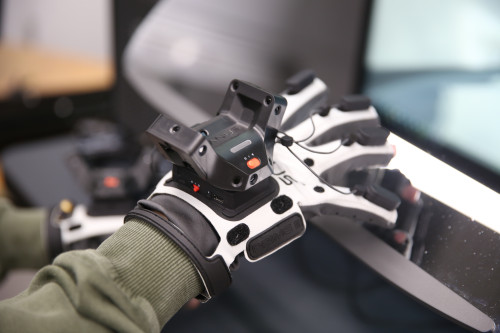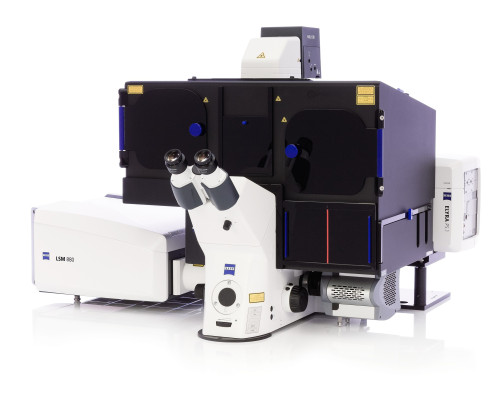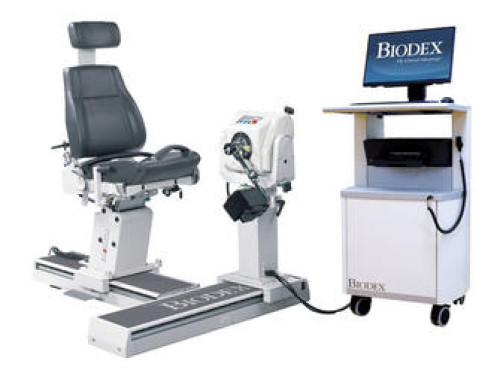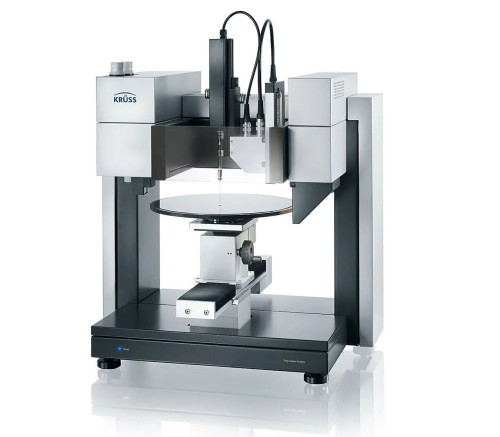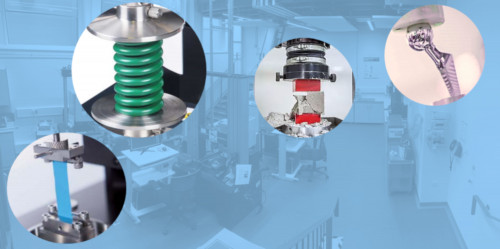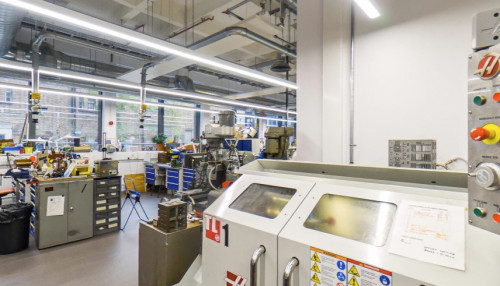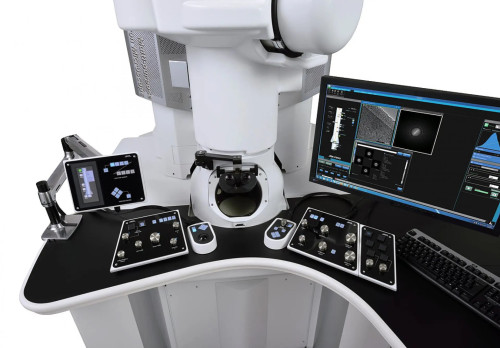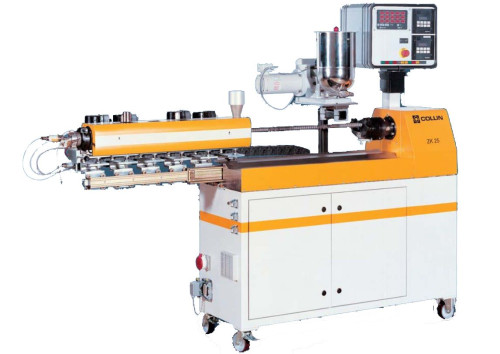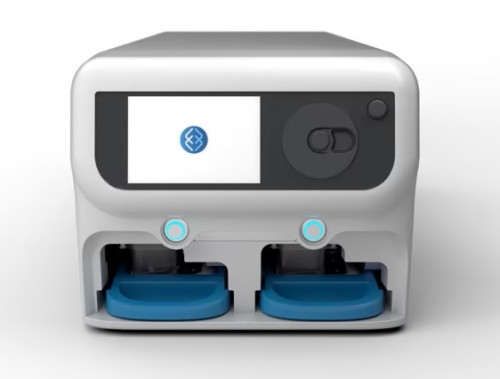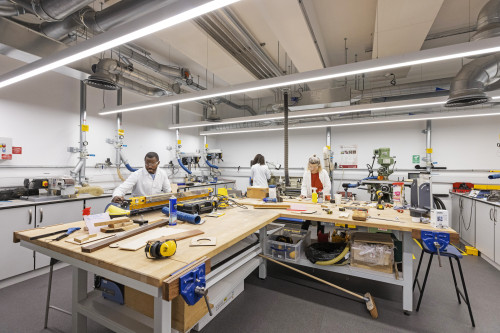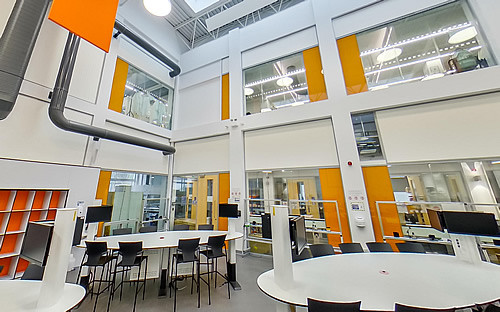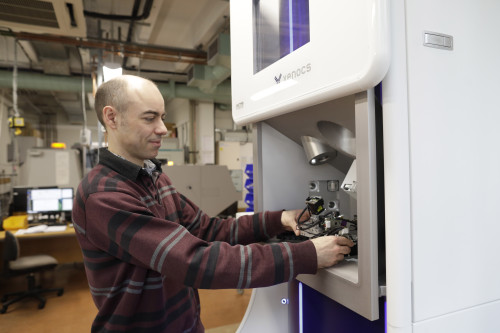Centre for Bioengineering
Facilities
On this page:
- Cell and Tissue Engineering Labs
- Centre for Advanced Robotics at Queen Mary (ARQ)
- Confocal Laser Scanning and Super-resolution Microscopy Lab
- Electrochemistry Facilities
- Human Performance Lab
- Intelligent BioFluids Lab
- Materials Characterisation Lab
- Mechanical Testing Facilities
- Mechanical Workshop
- Mechanobiology and BioAFM Laboratories
- Medical Electronics Facility
- NanoVision Centre
- Photoelectrochemical Imaging Lab
- Photoelectron Spectroscopy Facility
- Polymer Processing Facility
- Queen Mary+Emulate Organs-on-Chips Centre
- Spectroscopy Facility
- The Makerspace
- Thermal Analysis Facility
- Thermoelectric Suite
- Undergraduate Teaching Labs
- X-Ray Diffraction Facility
Cell and Tissue Engineering Labs
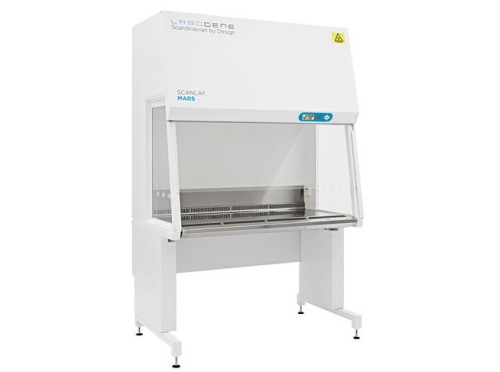
LaboGene Microbiological Safety Cabinet
Facilities for tissue engineering, mechanobiology and biomechanics research and teaching. The facilities include five dedicated cell culture laboratories, a molecular biology facility and general purpose and biochemistry laboratories. The labs house machines for mechanical testing of biological tissues or implantable materials as well as equipment for a wide range of biochemical/cell biology analysis.
Contact: Joanna Hickling
Centre for Advanced Robotics at Queen Mary (ARQ)
The laboratory is equipped with robotic arms, mobile platforms, mechatronic systems and control systems, which are used to research swarm robots, human-like robotic systems, virtual reality interfaces, haptic interfaces, and human motion tracking systems.
Contact: Prof Kaspar Althoefer
Confocal Laser Scanning and Super-resolution Microscopy Lab
A confocal microscopy containing two laser scanning confocal microscopes - a Perkin Elmer spinning disc system and a Leica SP2 with multiphoton laser and lifetime imaging system.
The lab is capable of live cell fluorescence imaging (GFP, calcium imaging etc), 3D reconstruction and morphological measurement, photobleaching assays such as FRAP and FLIP and fluorescence lifetime microscopy(FLIM). The microscopes also interface with sophisticated mechanical loading systems for tissues, individual living cells (micropipette aspiration) and artificial constructs.
Contact: Prof Martin Knight
Electrochemistry Facilities
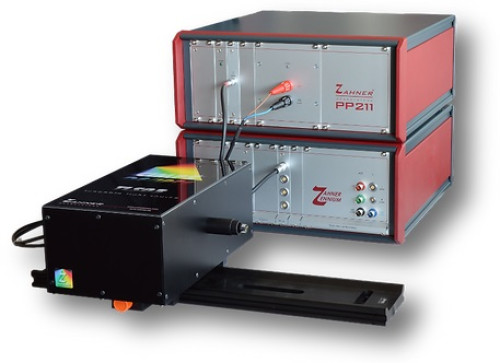
Zahner photoelectrochemistry station
We have a wide range of electrochemical and photoelectrochemical facilities for testing of energy materials. These include:
- Xe lamp 400W with solar simulator filter, potentiostat and electrochemical cell: for photocurrent measurements of photoelectrodes in multiple electrolytes, in a three-electrode (half cell) configuration, under 1 sun simulated conditions (with IR filter to avoid overheating of lamp and sample).
- Zahner photoelectrochemistry station: fully integrated photoelectrochemical workstation for high accuracy QE/IPCE measurements. Also with a tuneable LED light source that allows to measure photocurrent response at different wavelengths and possibility of measure electrochemical impedance spectroscopy, too.
- Rotating Disc Electrode (RDE) and potentiostat (with FRA for measuring electrochemical impedance spectroscopy): RDE in three-electrode electrochemical cell configuration with potentiostat to measure the electrocatalytic activity of new materials towards the oxygen evolution reaction (OER) and oxygen reduction reaction (ORR)
- Potentiostat Biologic (+/- 5V -10A) and redox flow battery system: for measuring the performance of electrode materials in full cell configuration for redox flow cell applications.
Contact: Dr Ana Sobrido
Human Performance Lab
We analyse motion and forces in people during walking, running and many other activities. Our state-of-the-art facilities allow us to assess normal subjects, elite athletes, patients who have had an operation, or individuals with some disability. The wide range of equipment available includes: force plate in the ground, treadmill that can accommodate wheelchairs and motion analysis facilities, and sensors for indicating when muscles are activated and an oxygen consumption monitor. All of these are used for undergraduate, clinical and research projects.
Contact: Dr Stuart Miller
Intelligent BioFluids Lab
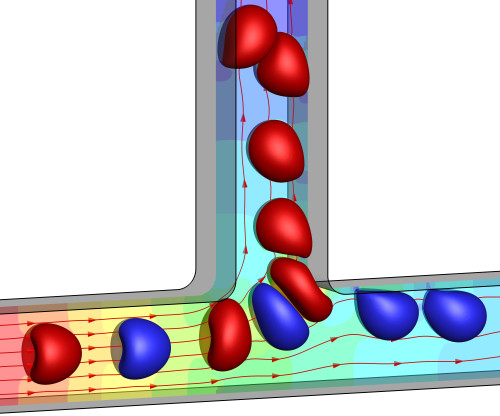
Hydrodynamic interaction of microcapsules in a microchannel bifurcation (front cover highlight in Journal of Fluid Mechanics volume 923)
Research in the intelligent biofluids and cell mechanics laboratory focuses on high-fidelity mechanical modelling and real-time ultra-high-throughput characterisation of blood and cancer cells, drug-delivery microcapsules. We also investigate flow and solute transport in extracellular matrices and interactions between flow and endothelial cells, with a particular interest in the endothelial glycocalyx. Our group integrates the state-of-the-art AI tools, mechanistic models, with microfluidic systems and high-speed imaging, to develop next-generation technologies for healthcare challenges such as cancer and cardiovascular diseases.
Contact: Prof Wen Wang, Prof Yi Sui
Materials Characterisation Lab
Contains a variety of analytical equipment to cover a broad range of tests, which are used for structural, thermal and mechanical analysis. The facility offers an analysis service to university-based and external users, both industrial and academic. The lab is located in the Engineering building (Room 232) at the Mile End campus. There are a range of charges for using these facilities.
Contact: Dr Shoghik Hakobyan
Mechanical Testing Facilities
This facility features advanced Instron testing machines for evaluating the mechanical properties of various materials in applications ranging from aerospace components to biomaterials. These systems apply compression, tension, and torsion forces, enabling detailed analysis of materials' strength, modulus, and other key characteristics. The lab can also conduct precise hardness measurements and more complex mechanical evaluations using BOSE systems, including a biaxial tester.
Contact: Dr Erica Di Federico
Mechanical Workshop
The purpose-built, fully equipped mechanical workshop manufactures parts for research projects in the Centre. The workshop contains both manual and CAD/CAM controlled milling and turning machines for high-speed production of complex components using a variety of materials. A state-of-the-art FDM 3D printer enables rapid prototyping in a broad range of thermoplastics
Mechanobiology and BioAFM Laboratories
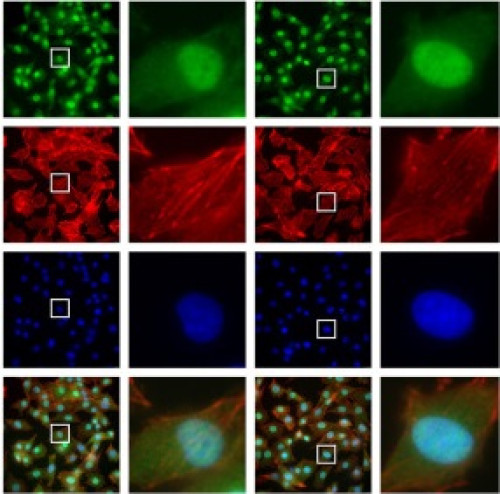
Epifluorescence images of YAP (green) and Actin (red)
A range of bioreactor systems for subjecting living cells to dynamic mechanical loading in the form of tensile strain (Flexcell), compressive strain (Bose) and fluid shear (Osciflow & Bose). These loading systems are mounted in cell culture incubators for long term loading studies.
We have equipment for measuring cellular mechanical properties and mechanically stimulating individual cells using biological atomic force microscopy (bioAFM), micropipette aspiration or custom built scanning ion conductance microscopy. We also have a range of mechanical test machines for measuring the mechanical properties of biological tissues and biomaterials under dynamic, uniaxial and biaxial loading conditions.
Contact: Prof Martin Knight
Medical Electronics Facility
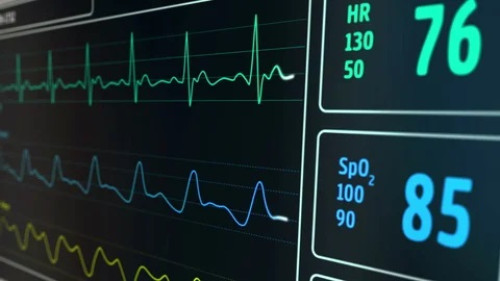
Electrocardiogram (ECG) and Oxygen Saturation level (SpO2) physiological signals.
A customised facility for undertaking electronics work with specific expertise in the medical field. The wide range of medical equipment includes ECG monitors, ultrasound probes and pulse oximeters. The laboratory also contains a wide range of electronics components and prototyping boards, as well as microprocessor software, to make your own circuitry. The facility is used for a range of taught laboratories that focus on circuit design, and is also available for MSc projects.
Contact: Ms Jun Ma
NanoVision Centre
The NanoVision Centre is a state-of-the-art microscopy unit which brings together the latest microscope techniques for structural, chemical and mechanical analysis at the nanometer scale (1/1000000 mm). The facility contains an impressive range of electron microscopes, scanning probe microscopes and associated analytical equipment for use in the cutting-edge research being conducted by students and staff.
Contact: Dr Subash Rai, Dr Qasim Zia
Photoelectrochemical Imaging Lab
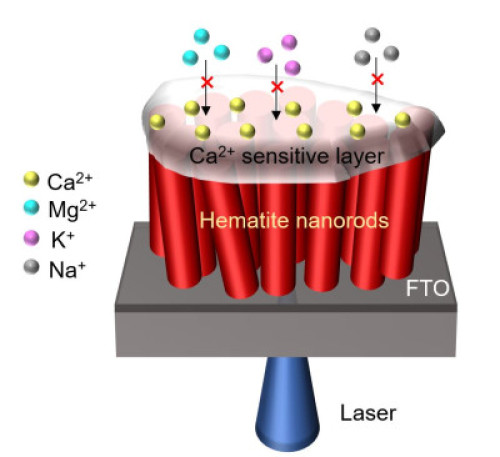
Photoelectrochemical calcium ion sensor based on hematite nanorods
Light-Addressable Potentiometric Sensors (LAPS) and Scanning Photo-induced Impedance Microscopy (SPIM) are imaging techniques based on photocurrent measurements at electrolyte/insulator/silicon (EIS) field-effect structures. They are capable of measuring local changes in the surface potential (LAPS), which can be used to image ion concentrations, and of measuring the local impedance (SPIM).
LAPS and SPIM have great potential as tools for functional electrochemical imaging of the attachment area of cells, providing information such as ion concentration, extracellular potentials and cell impedance. The techniques are particularly attractive for analysing responses of cells with planar polarisation or cell types that separate one compartment from the other as the cell-surface attachment area is not accessible to conventional electrophysiological and electrochemical imaging.
Contact: Prof Steffi Krause
Photoelectron Spectroscopy Facility
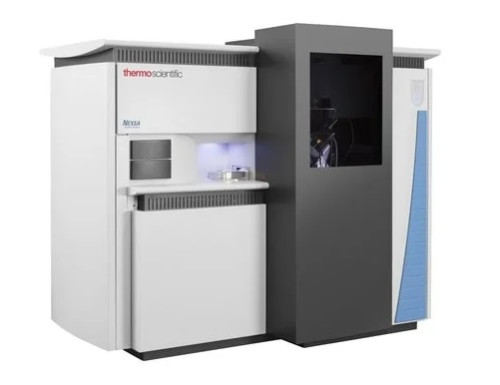
ThermoFisher Nexsa X-ray Photoelectron Spectrometer (XPS) System
A ThermoFisher Nexsa X-ray Photoelectron Spectrometer (XPS) System enables a range of photoelectron spectroscopy measurements on a range of materials. It includes facility for:
- X-ray photoelectron spectroscopy (XPS)
- Ultraviolet photoelectron spectroscopy (UPS)
- Reflection electron energy loss spectroscopy (REELS)
- Ion Scattering Spectroscopy (ISS)
Contact: Dr Richard Whiteley
Polymer Processing Facility
As the first UK Materials department (1967) and one of the five Science Research Council funded Polymer Research Centres in a Materials Department, we have a long standing history and extensive research expertise in polymer and composites processing. Ranging from melt-processing (single and twin-screw extruders, injection moulding, film blowing, solid state stretching) to solution processing (electrospinning, spin coating), a wide range of polymer processing and composites equipment is available at our lab.
Contact: Dr Dimitrios Papageorgiou
Queen Mary+Emulate Organs-on-Chips Centre
The QM+Emulate Organs-on-Chips Centre provides open access to Emulate’s Organs-on-Chips technology to enable researchers to use Emulate’s supported organ models which include: Liver, Proximal Tubule Kidney, Lung and Intestine or develop organ models of their design to expedite their experiments. Emulate's state-of-the art organ-chip platform is available for fundamental research or for use as part of a drug discovery pipeline. Expert staff are on hand to support with training and use of the platform. The Centre also provides opportunities for collaboration with Emulate and support for commercialisation and translational impact.
Contact: Prof Martin Knight
Spectroscopy Facility
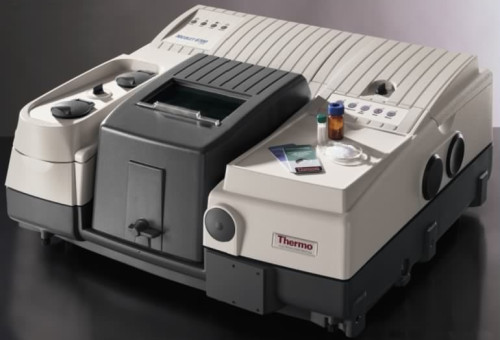
FTIR equipment for materials analysis.
We have a variety of sophisticated spectrometers which are used to identify specific compounds and investigate composition of materials prepared as either a liquid, solid, film or powder. These devices include:
- Fourier Transform Infrared Spectroscopy (FTIR)
- Raman Spectroscopy
- Near InfraRed Spectroscopy (uv-vis NIR).
Contact: Dr Shoghik Hakobyan
The Makerspace
The Makerspace is an open access workshop for all SEMS and EECS students and staff. It is a space where students can make things, this might be prototyping, model making or simply working on personal projects. The primary aim of the Makerspace is to give students the practical, and creative skills they will require to be effective engineers.
Contact: Mr James Wayland
Thermal Analysis Facility
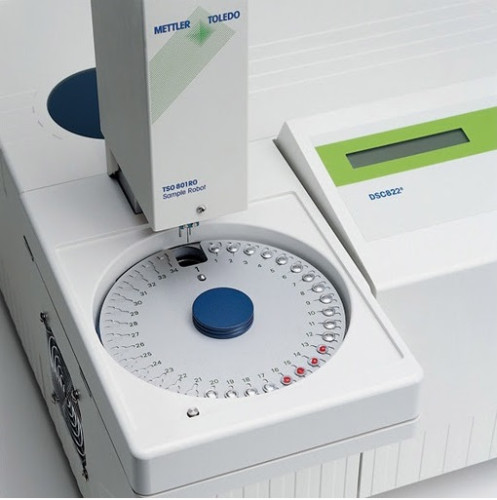
Differential Scanning Calorimeter.
We have a variety of excellent techniques for analysis the thermal properties of materials such as melting temperature, glass transition temperature, viscosity, thermal expansion and thermo-mechanical properties over a range of temperatures (-150 to 1600C). The techniques include:
- Differential Scanning Calorimetry (DSC)
- Rheometery
- Thermo Gravimetric Analysis (TGA)
- Simultaneous Thermal Analysis (STA)
- Dynamic Mechanical Analysis (DMA)
- Dilatometry.
Contact: Dr Shoghik Hakobyan
Thermoelectric Suite
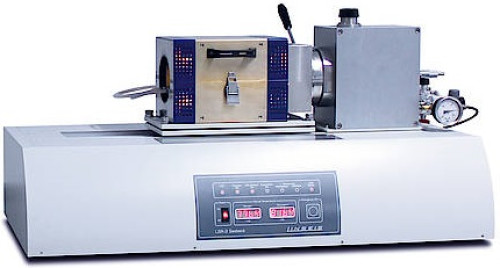
Electrical conductivity and Seebeck measurement (Linseis LSR3)
We house a suite of instruments for the accurate measurement of thermoelectric materials in bulk or thin film form, including:
- Laser Flash Analyzer (Netzsch 453 LFA)
- Electrical conductivity and Seebeck measurement (Linseis LSR3)
- Thin film zT (electrical and thermal conductivity, and Seebeck measurement) (Linseis TFA)
- MMR Seebeck System (MMR Inc)
- Optical in-plane thermal conductivity rig.
- Home-built Seebeck measurement rig.
We also have a bespoke thermoelectric generator testing rig with clamped and air-cooled modes.
Contact:
Prof Michael Reece
Dr Oliver Fenwick
Undergraduate Teaching Labs
We have recently invested £30M in major new teaching laboratories to provide state-of-the-art experimental facilities specifically for teaching.
Opened in 2016 the lab provides a space on the ground floor with step free access and has a height adjustable bench installed for wheelchair users.
Contact: Babatunde Aramide
X-Ray Diffraction Facility
The X-Ray Diffraction Facility (XDF) offers a full diffraction analysis service in materials science, structural chemistry, structural biology and solid state science. The facility recently welcomed a new Xenocs Nano-inXider SAXS/WAXD system for X-ray scattering, allowing us to characterise advanced materials to a new level of detail.
Contact: Dr Richard Whiteley


